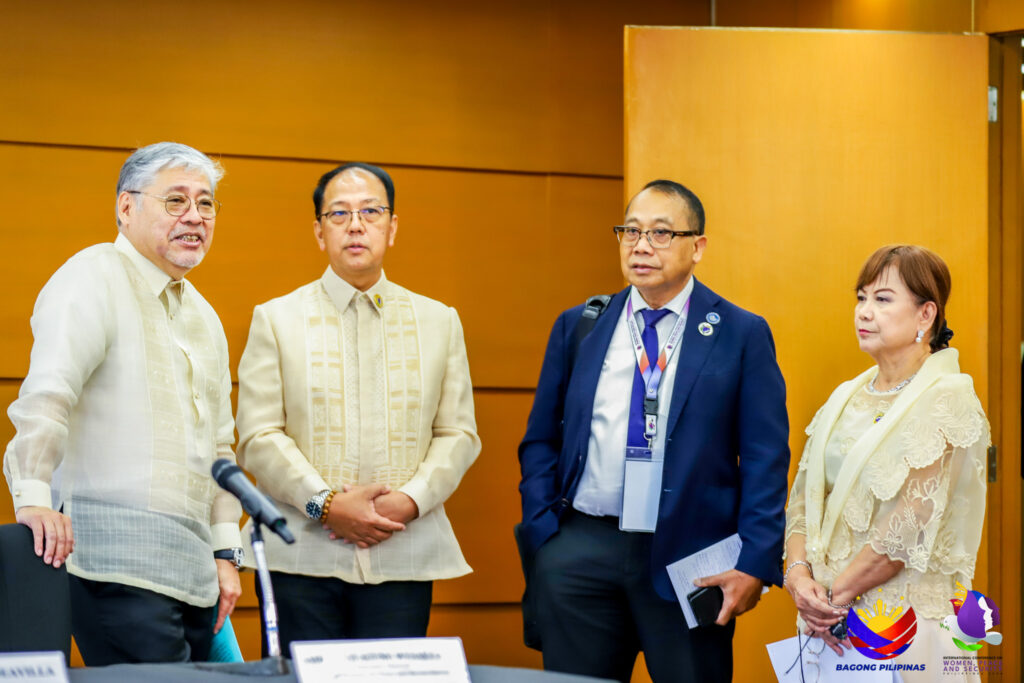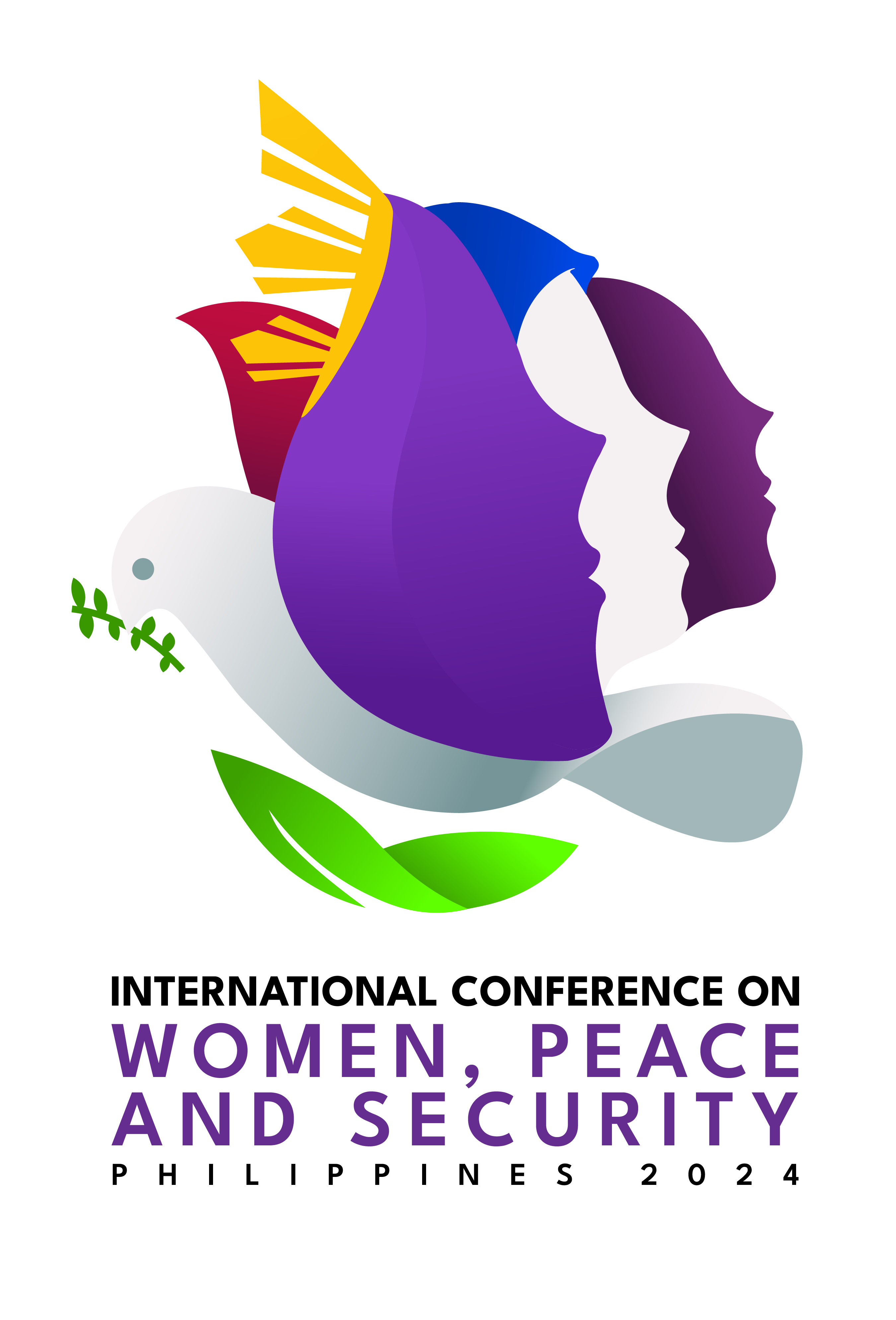Int’l conference on women adopts ‘Pasay Declaration;’ re-affirms global commitment to WPS Agenda

PICC, PASAY CITY (30 October 2024) — Ministers and representatives of over 70 United Nations (UN) Member States from various regions adopted the “Pasay Declaration on Women, Peace and Security,” re-affirming their commitment to advancing the global Women, Peace and Security (WPS) Agenda.
The Declaration was adopted on Monday, October 28, the first day of the International Conference on Women, Peace and Security (ICWPS) with the theme “Forging Collaboration and Convergence for Advancing Women, Peace and Security” in a session chaired by the Philippines.
The ICWPS is the first ministerial-level conference hosted by the Philippines which highlighted the power of synergy and collaboration, particularly in exchanging insights, sharing of best practices, and providing recommendations on how to effectively address challenges confronting women across the globe.
Equal, meaningful participation
“We underscore the importance of the full, equal and meaningful participation of women in the prevention and resolution of conflicts, peace negotiations, peacebuilding, peacekeeping, humanitarian response, and in post-conflict reconstruction,” the declaration read.
“We commit to enhance women’s full, equal and meaningful participation at all levels by prioritizing policies that actively remove barriers and create spaces for women’s leadership,” the document added.
The conference delegates underscored the significance of the landmark United Nations Security Council Resolution 1325, and other related resolutions, which “recognizes the important role of women in the building and maintenance of peace and security.”
“We express our strong commitment to promoting and achieving gender equality and to integrating a gender perspective in all peace and security processes,” the 22-paragraph declaration stressed.
“While we acknowledge the progress made, we emphasize the urgency of accelerating our efforts, removing barriers, and holding ourselves accountable for delivering tangible results,” it stated.
The Conference participants also reaffirmed their commitment to the 2030 Agenda for Sustainable Development, the United Nations Framework Convention on Climate Change, the Paris Agreement, and other international instruments.
A powerful commitment
“This declaration represents a powerful and unified commitment to advancing the Women Peace and Security agenda in our time, reaffirming the principles of the UNSC resolution 1325,” Philippine Foreign Affairs Secretary Enrique Manalo said in a press conference on Wednesday, October 29.
“It underscores that gender equality and women’s empowerment are not only fundamental rights or human rights but are essential to achieving sustainable peace and development,” Manalo added.
According to the foreign affairs chief, the declaration highlights “several crucial dimensions” affecting women, including the “increasingly urgent nexus between climate peace and security.”
“It calls upon member states to address these intersecting challenges by integrating gender-responsive approaches to climate action, ensuring sustainable funding, and promoting women’s leadership in climate resilience and disaster,” Manalo said.
He vowed that the Philippines will carry forward this declaration as it engages in broader multilateral agendas such as the upcoming 29th Conference of Parties under the UN Framework Convention on climate change.
Creating spaces for stronger women’s participation
Budget and Management Secretary Amenah Pangandaman cited the crucial need to actively involve women in the aspects of financing and legislation, partnership-building, as well as addressing concerns on climate, peace, security and digitalization.
“Throughout discussions, one of the most salient best practices highlighted…the importance of inclusive participation. We have seen firsthand their transformative impact of integrating women’s voices at all levels of decision making,” Pangandaman said.
“The success shared by various delegations demonstrates that when women are involved, peace agreements are more sustainable, leading to a stronger and more resilient society,” she added.
Pangandaman also emphasized the importance of ensuring that women can safely speak about their experiences, as this allows authentic voices to guide strategies, promotes healing, and empowerment, and informs actions that address gender-based challenges.
“When women feel secure in sharing their stories, it strengthens advocacy efforts and foster solidarity across diverse communities and this leads to more inclusive and impactful solutions,” she declared.
Impact of armed conflict
Ermelita Valdeavilla, Chairperson of the Philippine Commission on Women (PCW), drew attention to the impact of armed conflicts on citizens worldwide, particularly those taking place in the Democratic Republic of Congo, Ukraine, Myanmar, Sudan, Somalia, and Gaza.
“The United Nations reveals that as of June 2023,100 million people worldwide have been forcibly displaced due to persecution, conflict, violence, and human rights violations,” Valdeavilla reported.
“This situation gives rise to unprecedented humanitarian situations characterized by uncertainty, economic deprivation, statelessness, and other threats to human security,” she added.
This situation, Valdeavilla noted, has exacerbated pressures on women’s already depleted time and energy, “exacting from them enormous physical and emotional toll that affect their overall well-being and health,” rob them of opportunities, and push them further to the edge.
She, thus, thanked the conference delegates “for the strong solidarity they demonstrated,” stressing, “I call upon them to build upon that solidarity beyond the end of this conference because actions should follow our commitments and words.”
No one to be left behind
According to Ambassador I Gusti Agung Wesaka Puja, Executive Director of the Asean Institute for Peace and Reconciliation, “no should be left behind” in pushing forward the global Women, Peace and Security agenda.
To realize this effort, Puja stressed that “male champions are also needed to echo the women’s voices.”
The ambassador also highlighted the need to strengthen existing regional peace mechanisms, as well as to provide the platform for greater and more meaningful collaborations.
He also cited the importance of providing a democratic, safe space that will enable peace stakeholders to achieve objectives, exchange experiences and explore common priorities on the WPS agenda.
“One country security’s problem is also the security problems of the others,” Puja said.
Establishment of PH’s ‘WPS Center of Excellence’
Meanwhile, Presidential Peace Adviser Secretary Carlito G. Galvez, Jr. highlighted the major accomplishments of the three-day conference, and how it has helped push forward the global WPS agenda.
“From high level meetings to roundtable discussions, to thematic discussions, all of these gatherings gave us an opportunity to share our insights, recommendations and best practices on how we can best advance the women, peace and security agenda,” Galvez said.
The peace adviser also cited the signing of Memorandum of Understanding (MOU) between the governments of the Philippines and the United States, as represented by the US State Department Office on Women Global Issues and OPAPRU, respectively, on the establishment of the Center of Excellence on Women, Peace and Security in the Philippines.
Galvez noted that the Philippines is only the fourth country in the world that will have its own WPS Center of Excellence.
“With the Philippines having its own WPS Center of Excellence, our country envisions becoming a regional hub for Southeast Asia in promoting the advancement of the WPS agenda in the region,” he said.
Ways forward
The Pasay Declaration contained major commitments made by conference delegates to ensure that the voices of women are not only heard and acknowledged, but more importantly, the challenges they are facing are addressed in the best way possible.
“We commit to promote women’s leadership in mediation processes and to actively take steps to set ambitious and measurable targets for women’s direct participation on delegations and negotiating teams,” the document said.
The Declaration also vowed “to push for the appointment of women as lead mediators in peace processes, adding, “We will publicly track and report these targets to ensure transparency and accountability.”
Conference delegates also pledged to “actively take steps to set ambitious and measurable targets for women’s direct participation on delegations and negotiating teams and the appointment of women as lead mediators in peace processes.”
The Declaration likewise committed to undertake measures “for the financing and wider awareness and visibility of the Women Peace and Security agenda in development and humanitarian plans and programs at international, regional and national levels…”
Participants to the conference also promised to establish and implement mechanisms that will guarantee greater transparency and continuous improvement in the implementation of the WPS agenda.
“We acknowledge that the responsibility for implementing the Women, Peace, and Security agenda is shared by all, ensuring a comprehensive and collaborative approach to achieving sustainable peace and security for everyone,” the declaration said.
“We encourage Member States to consider joining the WPS Focal Points Network and engage with this cross-regional forum for sharing experiences and best practices in advancing the implementation of all Security Council resolutions on Women, Peace and Security,” it added.
The ICWPS was organized by the Department of Foreign Affairs (DFA), Office of the Presidential Adviser on Peace, Reconciliation and Unity (OPAPRU), Department of Budget and Management (DBM), and Philippine Commission on Women (PCW), in partnership with the Philippine Center for Islam and Democracy, and the ASEAN Institute for Peace and Reconciliation and UN Women, with the support of the Office of Senator Loren Legarda.

